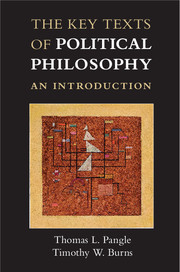Book contents
- Frontmatter
- Dedication
- Contents
- Acknowledgments
- Introduction
- Part I Classical Political Philosophy
- 1 Plato’s Apology of Socrates
- 2 Plato’s Republic, Book One
- 3 Aristotle’s Politics
- Part II Biblical Political Theology
- Part III Modern Political Philosophy
- Part IV Modernity in Question
- Name Index
- Subject Index
- References
1 - Plato’s Apology of Socrates
Published online by Cambridge University Press: 05 October 2014
- Frontmatter
- Dedication
- Contents
- Acknowledgments
- Introduction
- Part I Classical Political Philosophy
- 1 Plato’s Apology of Socrates
- 2 Plato’s Republic, Book One
- 3 Aristotle’s Politics
- Part II Biblical Political Theology
- Part III Modern Political Philosophy
- Part IV Modernity in Question
- Name Index
- Subject Index
- References
Summary
The history of political philosophy may be said to begin with the courtroom drama that led to the execution of the thinker who founded the enterprise. Socrates (469–399 BC) wrote nothing for publication. In his own lifetime he was made notorious as the central, dubious character in Ancient Greece’s greatest comedy, the Clouds by Aristophanes (446–386 BC). After his execution, Socrates was portrayed much more favorably and seriously in numerous dialogic dramatizations by his students, above all Xenophon (431–355 BC) and Plato (427–347 BC). None of these depictions of Socrates purport to be histories. They are products of the dramatic art. Their purpose is not to preserve an exact record of what Socrates actually said, but rather to convey what it was like to encounter Socrates – and thereby to be aroused to intense, perplexed, and critical thinking about profound and abiding problems of human existence. All of Plato’s Socratic dialogues, and not least his Apology of Socrates, are rich in deliberately provocative puzzles meant to stimulate probing detective work – through repeated rereading, with alertness and with dogged and even suspicious questioning. The Platonic dialogues are meant to constitute a kind of training ground for becoming a human being who goes through life truly awakened, by Socrates and Socratic questioning, to life’s depths and challenges.
The Challenge to Our Way of Thinking
Plato’s Apology presents Socrates delivering his sole public account of his life as a whole and what he lived for. But the account takes the form of a defense in a criminal trial that culminates in Socrates’ death sentence. Plato thus provokes a number of questions: What is it about Socrates, and his way of life, in relation to the political society around him, that leads to so dire a clash with the legal authorities? Is this not a blamable, avoidable crime on the part of the Athenian democracy? Or at least a terrible accident, the result of a deep misunderstanding? Or is there something essential to Socratic political philosophy that makes it unavoidably threatening to lawful society, and hence always in danger of lawful punishment? What answer does Plato mean to teach us?
- Type
- Chapter
- Information
- The Key Texts of Political PhilosophyAn Introduction, pp. 13 - 35Publisher: Cambridge University PressPrint publication year: 2014



